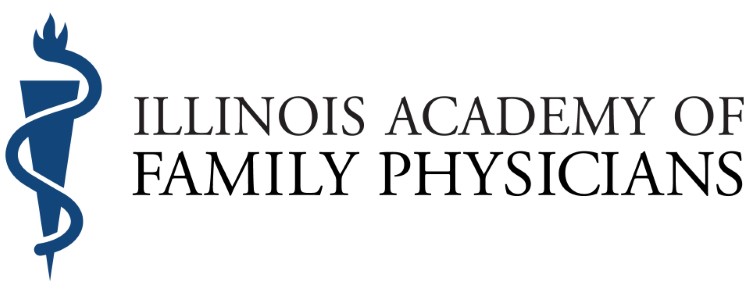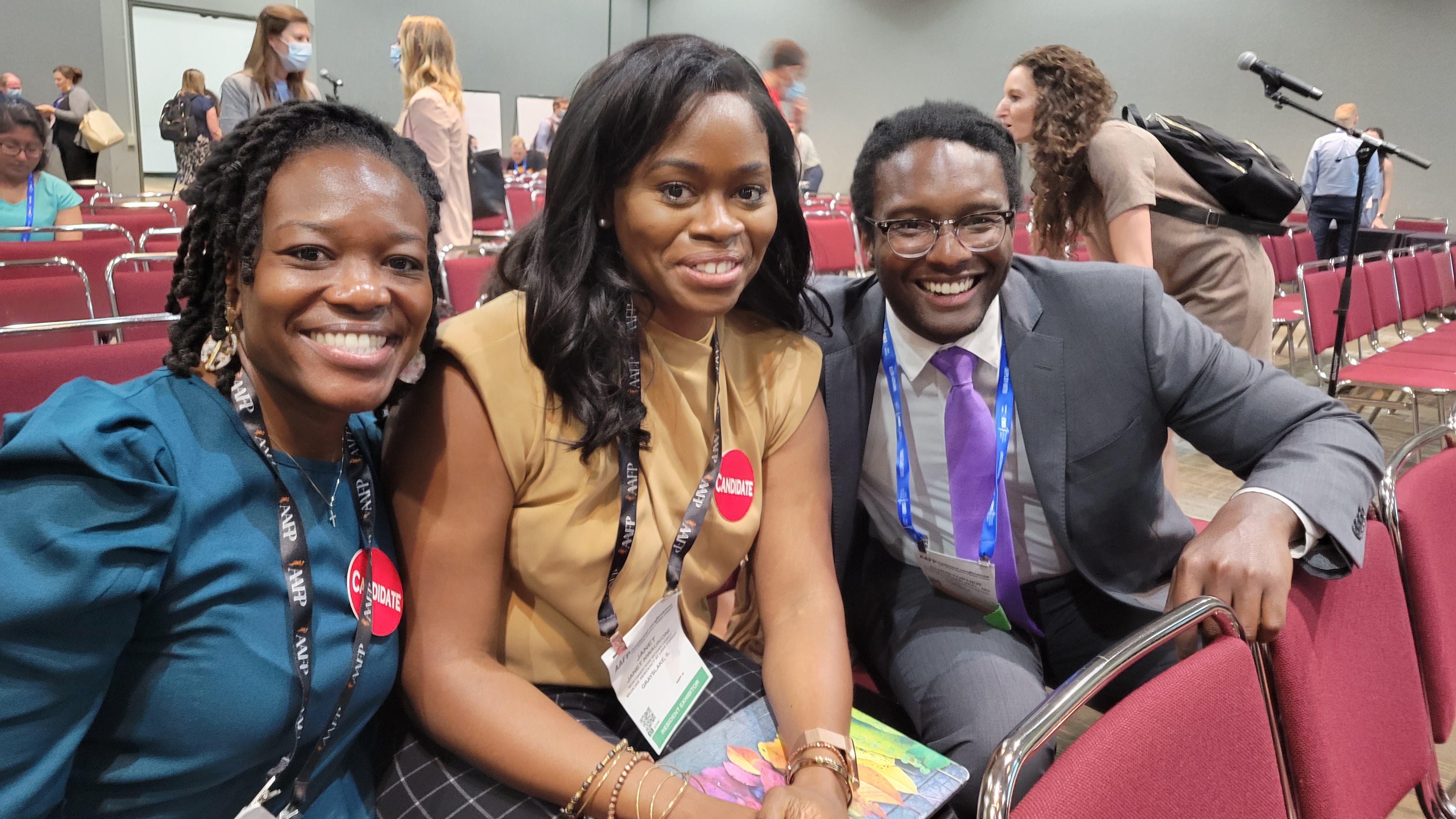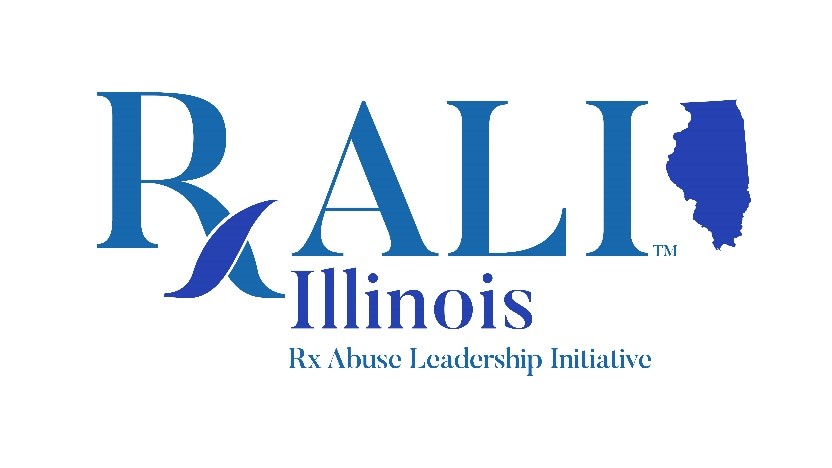To say attending this year’s American Academy of Family Physician’s (AAFP) National Conference was a life-changing experience for me would be an under-statement. I have never left a conference feeling more engaged, inspired, and galvanized than I am today after attending this conference. I am indebted to the tireless efforts of those who led and organized this truly spectacular event. As the Illinois Resident Delegate, I was honored to represent our state and delegation, IN PERSON, at the 47th annual AAFP National Conference in Kansas City, Missouri. Though this was my first AAFP National Conference, I was comforted by the hundreds of other medical students and Family Medicine residents who were also new to this 3-day gathering. I was even more enchanted when I ran into four of my former classmates from medical school (The Larner College of Medicine at the University of Vermont) who were at the conference representing their respective family medicine residency programs.
As the Illinois Resident Delegate, I wanted to ensure I spoke to as many members of the Illinois Family Medicine caucus as possible. Surveying the vast 2100 section of the expo hall within the Kansas City Convention Center, I was thrilled to see Illinois well represented! While I was tempted to linger at my program’s booth, I was eager to hear the concerns of the residents from across our state. As I spoke with residents from the prairie fields of Southern Illinois to densely populated Cook County I noticed a consistent concern about the future of our profession and the lives of our patients in a world that appears to be changing faster than anyone anticipated. One example of this was described by Dr. Stephanie Miles and Dr. Janet Nwaukoni of the Northwestern Medicine Family Medicine Residency Program in Lake Forest. In the wake of the devastating July 4 mass shooting in the adjacent suburb of Highland Park, Dr. Nwaukoni spoke of the fear she continues to have of falling victim to a unpredictable shooting as she tries to carry out her typical day-to-day routine. Further translating this to the mental toll this has taken on her patients, Dr. Miles shared her concern for the impact this will have on the community she serves. On the other side of the state, several residents from Southern Illinois University (with programs serving Alton, Decatur, Carbondale, and Springfield) voiced an uncertainty regarding the future of our training in obstetrics given the recent changes in policy in surrounding states following the US Supreme Court’s decision to overturn Roe v. Wade.
Certainly, our concerns as resident physicians reflect the times in which we live. But these concerns don’t vanish after completion of PGY-3, clearly articulated by the National Conference’s opening keynote speaker, former White House National Vaccination Coordinator, Dr. Bechara Choucair. While his 5-year tenure as Commissioner of the Chicago Department of Public Health undoubtedly made a huge impact on Illinois, his current efforts in prioritizing “social health” are redefining how we respond to the social determinants of health that continue to plague our most vulnerable communities. Through his current role as Chief Health Officer at Kaiser Permanente, he has implemented systemic changes focused on addressing social factors that impact the health of a community and proactively identifying social needs, connecting members to resources, and establishing support and follow-up in the key domains of food insecurity, homelessness and social isolation (just to name a few). At the end of his talk, he made one simple request for the medical students and family medicine residents in the audience of 2,000+: “Keep equity at the center of everything you do.”
I carried the wise words and actions of Dr. Choucair and the growing concerns resident and I have to the Joint Session of the Resident and Student Congresses later that day. I thought about the trauma being endured by so many in the wake of the issues plaguing our times and our profession. From the global trauma of COVID-19 to the unfortunate uniquely American trauma of school shootings. The pain being is real. We can no longer ignore the impact trauma has on our mental and physical health; and the AAFP recognizes this. Last year, the AAFP formally recognized the importance of a Trauma-Informed Care approach to how we deliver care and urged its members to understand and incorporate Trauma-Informed Care into clinical practice. The Accreditation Council for Graduate Medical Education (ACGME) has taken this one step further by issuing a new policy in its most recent revision of ACGME Program Requirements for Graduate Medical Education in Family Medicine for deliberate education and training in Trauma-Informed Care. While this new requirement is groundbreaking in its presence, it is unfortunately vague and subject to mischaracterization of what it means to be truly “trauma-informed”. With this in mind, I wrote Resolution R3-301. This resolution requests the AAFP issue recommended curriculum guidelines for family medicine residency training in trauma-informed care, in addition to providing these recommendations to the ACGME for their consideration and guidance for programs on implementation for the existing program requirement for education in trauma-informed care. With these guidelines we have the potential to change the culture of how we deliver medicine by adopting a more empathetic and holistic approach to patient care. We must move from asking our patients the one-sided question of “What’s wrong with you?” to asking the more trauma-informed and insightful question of “What happened to you?” I’m proud to report that this Resolution was adopted by the National Congress of Family Medicine Residents and will be forwarded to the AAFP Congress of Delegates for review at their upcoming meeting in September.
Adding to our celebrations, IAFP member and PGY-2 Northwestern Medicine-Lake Forest Resident, Dr. Janet Nwaukoni, was elected to serve as an Alternate Delegate to the Congress of Delegates and will thereby serve as a Delegate at the 2023 Congress of Delegates, which will beheld in Chicago, by the way! I was swept up in emotion after I recognized the historic nature of demographic representation in the Illinois Leadership Delegation for the AAFP at all levels. To see our leaders representing a spectrum of gender, sexual orientation, race and ethnicity, truly reminds me of how special Illinois is. I continue to be honored to represent such a remarkably dynamic group of physicians and I look forward to continuing to celebrate the awesome advances we make individually, locally through the IAFP, and nationally through the AAFP. The best is yet to come!




